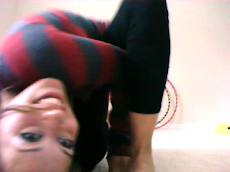Lago Atitlan is the most beautiful lake in the world.
So proclaim a history of writers and explorers, drawn here by the mystery of the morning mists over the water. Ancient volcanoes sleep at its edges and the Mayans, isolated to the extreme, appear to live as they have for thousands of years. From village to neighbouring village, one's ears prick with completely different dialects. Weak sunlight glints from the sparkling fabrics of the ladies, who keep their spirits alive in the startling threads of the full, traditional costume.
I first came to Guatemala in 2008, on a trip designed as a test for this current journey.
At that stage my hula-hoop loop was just a twinkle in my eye, and the perspective of that holidaying office girl painted a perfectly-proportioned picture of my future quest.
I spent ten dreamy days on the shores of Atitlan in a sleepy village called San Pedro, absorbing myself in the solitude of single travel and the intense peace of the rocks.
I had rarely seen such beautiful evenings.
Today I return, this time in the middle of a moody rainy season that paints the mountain-scratched skies with emotion. We enter San Pedro on one of Guatemala's famous chicken buses, painted beautifully kitch colours and packed eight across.
I barely recognise the town.
From the emptiness of the Christmas weekend two years ago has birthed a town for tourists, crawling with white faces and shamelessly-plugged memorabilia. The locals unsmilingly rip me off at the market and, in sharp contrast to the rest of Guatemala and Mexico, flatly refuse a bargain.
I am shocked at the difference between this town and my memory. Not only that, but I quickly discover that the lake has turned toxic and is only weeks away from a devastating algal bloom.
It is as if this postcard memory has been decomposed by first-world scum.
The worst is the singing. Every morning at 6am, the loudspeaker cries of Evangelist churches echo in symphony across the lake, blasted from each village in a call to convert the few remaining Mayans.
The 1970s left a crater of devastation in the wake of civil war and natural disaster, providing vulture-like missionaries the perfect conditions in which to descend. In the midst of destruction and agony, new religions proliferated and churches, foreign-funded, were often the first buildings up in the most hard-hit areas.
Converts tell tales of miraculous healings. Gifts of money and American trinkets.
Now, perched smugly upon the old houses of San Pedro, a church more like a wedding cake than a building shits over the spirits of the lake.
I am disgusted.
The same thing has happened to virtually all of the indigenous traditions across Mexico and Central America. No doubt to the rest of the world.
While to the untrained eye, the locals may look as they always have, in reality the addition of new religion has divided neighbouring villages, keeping people under strict, unofficial laws (in many villages the church owns the land, dictating where the villagers may work and live and when they may leave).
But (I pathetically justify to myself) this is nothing new. Catholicism, unsurprisingly, is the principal religion of the region, brutally imposed by the conquering Spaniards hundreds of years ago. Indigenous practices survived this steamrollering by learning to adapt and unite in a deeply interesting combination of traditional beliefs and that of the Vatican. Up until the second half of the last century, the music of the ancients continued to sing in this syncretic meld of faiths known as costumbre (custom).
Somehow, however, the loudspeaker ceremonies of the Evangelists seem unbearable in comparison.
The voice of the ancients, crushed under the pretence of development. I am left slightly flustered, wondering what to do.
Nothing can take away the beauty of this lake.
But the changes within myself have been highlighted by my return.
I realise how uninspired I am by the idea of going out to drink in cute, themed bars. I watch old hippies, drawn by the energy of the lake, overtly take photographs of the locals as if they are no more than animals. I see how repulsed I am by the damage the rest of this world has done to the culture of this village.
I do not want to make it worse.
When Eva and Toño leave after a few days, I happily board the boat away from this town.
I seek retreat.
Saturday, August 7, 2010
Subscribe to:
Post Comments (Atom)

No comments:
Post a Comment